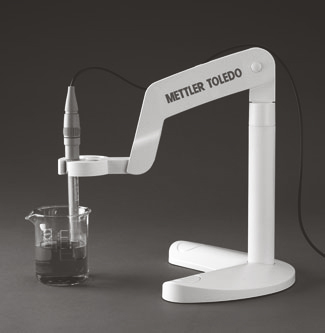pH Probe Conditioning and Care
 Like all measuring instruments, pH meters are delicate devices that require proper handling to ensure a long life of accurate results. Below is a quick reference guide for conditioning, cleaning, and maintaining your pH meters and pro
Like all measuring instruments, pH meters are delicate devices that require proper handling to ensure a long life of accurate results. Below is a quick reference guide for conditioning, cleaning, and maintaining your pH meters and pro
Conditioning the pH Probe
Before using your probe for the first time:
- Rinse the electrode with distilled or deionized water.
- Soak in a pH 4.0 or pH 7.0 buffer solution for 20 minutes.
- Rinse again with distilled or deionized water.
Cleaning
To prevent cross-contamination, clean your probe before and after storage, and between each sample.
- Routine Cleaning: Rinse the electrode with distilled or deionized water. Blot (do not wipe) excess moisture with a lint-free paper.
- Heavy Cleaning: If the probe is dusty, has heavy crystallization, or has dried out, it may require professional cleaning and calibration.
General Use Guidelines
- Submerge the probe only after your test solution is prepared.
- Avoid rapid temperature changes, vibrations from stirring equipment, or other unnecessary stress.
- Clean the probe immediately after each measurement, then either begin your next test or place it into storage.
- Never leave the probe exposed to air for extended periods—it will dehydrate.
- Do not use the probe as a stirring rod or for anything other than measurement.
Probe Storage
- A pH probe should never be allowed to dry out.
- Store the probe in the manufacturer-provided rubber boot or a specialized container with the correct storage solution.
- Do not store in deionized water—this will damage the electrode.
- Acceptable storage solutions include 4M KCl, pH 4.0 buffer, or pH 7.0 buffer (refer to your meter’s instruction manual for specifics).
Refilling (If Applicable)
For refillable electrodes:
Fill the probe up to—but not past—the refill hole.
Keep the fill hole open during measurement for proper operation.
Calibration
- Regular calibration is essential for reliable results.
- Calibration corrects measurement drift and keeps your pH meter within process tolerance.
- As probes age, they will require more frequent calibration and eventually replacement.
- Slower measurement response times often indicate it’s time to replace the probe.
How System Scale can help
System Scale offers ISO/IEC 17025-accredited pH meter calibration services. Our three-point calibration process ensures the widest range of reliable results. We can also help you develop calibration schedules tailored to your procedures, so your pH meter is never out of tolerance.